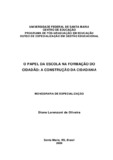| dc.contributor.advisor | Mousquer, Maria Elizabete Londero | |
| dc.creator | Oliveira, Dione Lorenzoni de | |
| dc.date.accessioned | 2018-05-15T10:55:21Z | |
| dc.date.available | 2018-05-15T10:55:21Z | |
| dc.date.issued | 2006-12-19 | |
| dc.date.submitted | 2006 | |
| dc.identifier.uri | http://repositorio.ufsm.br/handle/1/13187 | |
| dc.description | Monografia (especialização) - Universidade Federal de Santa Maria, Centro de Educação, Curso de Especialização em Gestão Educacional, RS, 2006. | por |
| dc.description.abstract | The present study to analyze the paper of the school in the formation of the citizen, in
the construction of the citizenship. This construction not only happens in the
pertaining to school context, but also from the first social groups that the individual
belongs, that is, the familiar one. However, in this work, the focus is given in the
structure of the pertaining to school management, which requires democratic
perspectives, with the engaged participation of all the pertaining to school community,
in view of the development of the potentialities of the process of citizenship ahead of
the challenges of after-modernity. The conception of challenges of after-modernity is
characterized, in this work, as the keeping out of society processes, of poverty and
violence, being worked in the school by means of its practical democratic, of its
politics, the proper culture of the place where the individuals that frequent the schools
public and of the education learning process are inserted. The construction of the
citizenship estimates the possibility of participation of the human being in its cultural
partner context that carries through at different moments and stages of its existence
for the access when knowing, knowing to make, to be and to coexist, through the
knowledge systemize and organized for the school. The task of the education is to
develop and to consolidate new practical of coexists, capable to face the challenge to
recoup the cultural partner difference as distinct relation: relation effectively
constructed, that has in solidarity the bedding for the construction of an educative
position that does not see the other and to another culture as it fails or as mere
difference, but recognizes it as legitimate other. What it implies to think the classroom
as plural space that congregates different citizens and different cultures that translate
different forms to organize the real and to answer to the challenges of the daily life.
This is the waited process of education learning, where professors and pupils deal
with adverse situations and together they contribute for the construction of the
knowledge. Therefore, for the recital of this work, theoretical support in authors
searched as Alarcão, Anastasiou, Boaventura Santos, Bobbio, Gadotti, Gramsci,
Libâneo, Oliveira, Paro, Saviani among others. | eng |
| dc.language | por | por |
| dc.publisher | Universidade Federal de Santa Maria | por |
| dc.rights | Acesso Aberto | por |
| dc.rights | Attribution-NonCommercial-NoDerivatives 4.0 International | * |
| dc.rights.uri | http://creativecommons.org/licenses/by-nc-nd/4.0/ | * |
| dc.subject | Cidadania | por |
| dc.subject | Práticas democráticas | por |
| dc.subject | Cultura | por |
| dc.subject | Ensinagem | por |
| dc.subject | Citizenship | eng |
| dc.subject | Practical democratic | eng |
| dc.subject | Culture | eng |
| dc.subject | Education learning | eng |
| dc.title | O papel da escola na formação do cidadão: a construção da cidadania | por |
| dc.title.alternative | The school paper in the citizen formation: the construction of the citizenship | eng |
| dc.type | Trabalho de Conclusão de Curso de Especialização | por |
| dc.degree.local | Santa Maria, RS, Brasil | por |
| dc.degree.specialization | Gestão Educacional | por |
| dc.description.resumo | O presente estudo analisa o papel da escola na formação do cidadão, na
construção da cidadania. Essa construção acontece não só no contexto escolar, mas
a partir do primeiro grupo social a que o indivíduo pertence, ou seja, o familiar.
Porém, neste trabalho, o foco se dá na estrutura da gestão escolar, a qual requer
perspectivas democráticas, com a participação comprometida de toda a comunidade
escolar, tendo em vista o desenvolvimento das potencialidades do processo de
cidadania diante dos desafios da pós-modernidade. A concepção de desafios da pósmodernidade
está caracterizada, neste trabalho, como os processos de
marginalização, de miserabilidade e de violência, sendo trabalhados na escola por
meio de suas práticas democráticas, de sua política, da própria cultura do lugar onde
estão inseridos os indivíduos que freqüentam as escolas públicas e do processo de
ensinagem. A construção da cidadania pressupõe a possibilidade de participação do
ser humano em seu contexto sociocultural que se realiza em diferentes momentos e
etapas da sua existência pelo acesso ao saber, saber fazer, ser e conviver, através
do conhecimento sistematizado e organizado pela escola. A tarefa da educação é
desenvolver e consolidar novas práticas de convivência, capazes de enfrentar o
desafio de recuperar a diferença sociocultural como relação de alteridade: relação
efetivamente construída, que tem na solidariedade o fundamento para a construção
de uma postura educativa que não vê o outro e a outra cultura como falha ou como
mera diferença, mas o reconhece como legítimo outro. O que implica pensar a sala
de aula como espaço plural que congrega diferentes sujeitos e diferentes culturas,
que traduzem diferentes formas de organizar o real e responder aos desafios da vida
cotidiana. Esse é o processo de ensinagem esperado, onde professores e alunos
lidem com situações adversas e juntos contribuam para a construção do
conhecimento. Portanto, para a fundamentação deste trabalho, buscou-se suporte
teórico em autores como Alarcão, Anastasiou, Boaventura Santos, Bobbio, Gadotti,
Gramsci, Libâneo, Oliveira, Paro, Saviani entre outros. | por |
| dc.publisher.country | Brasil | por |
| dc.publisher.initials | UFSM | por |
| dc.subject.cnpq | CNPQ::CIENCIAS HUMANAS::EDUCACAO | por |
| dc.publisher.unidade | Centro de Educação | por |



